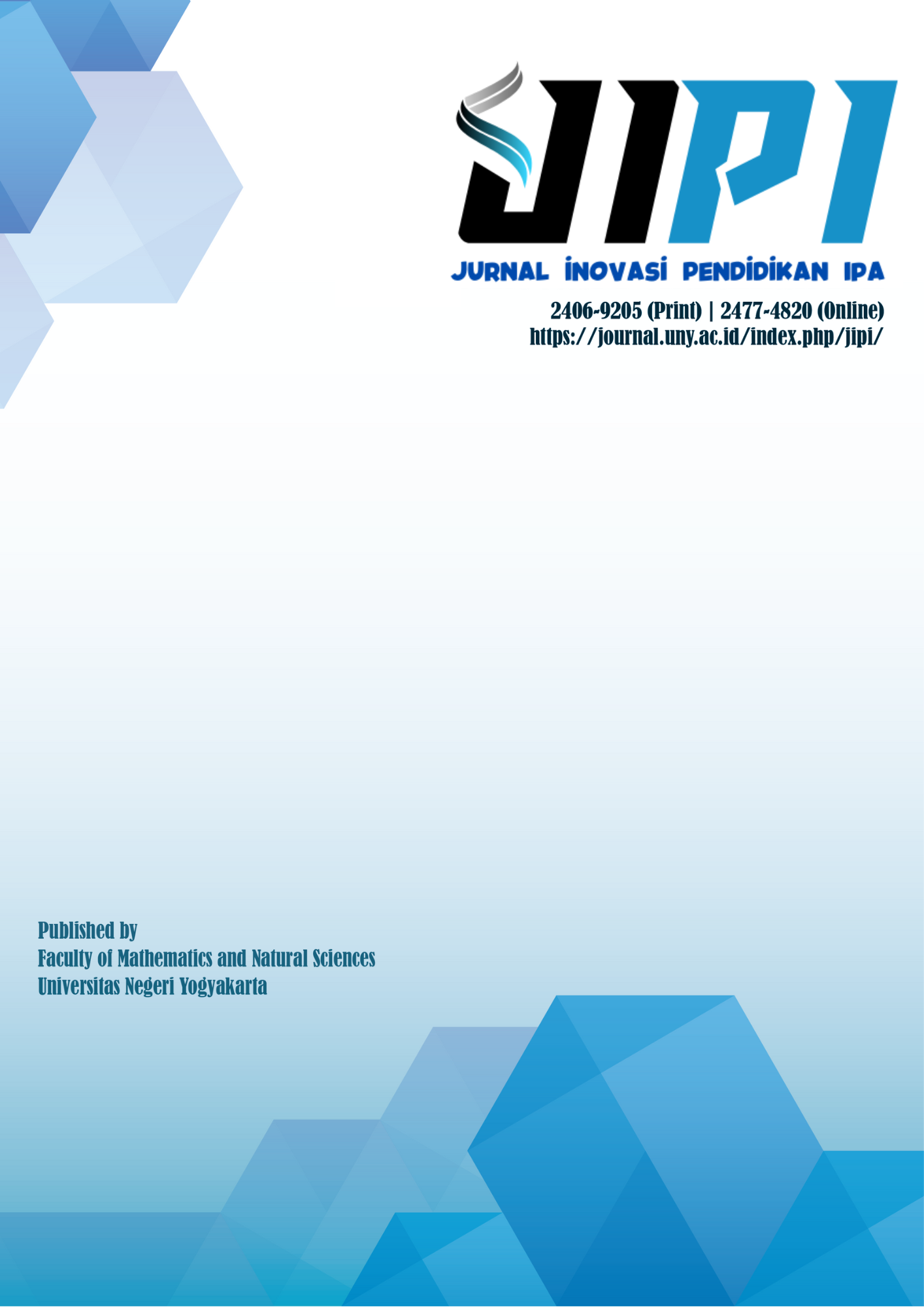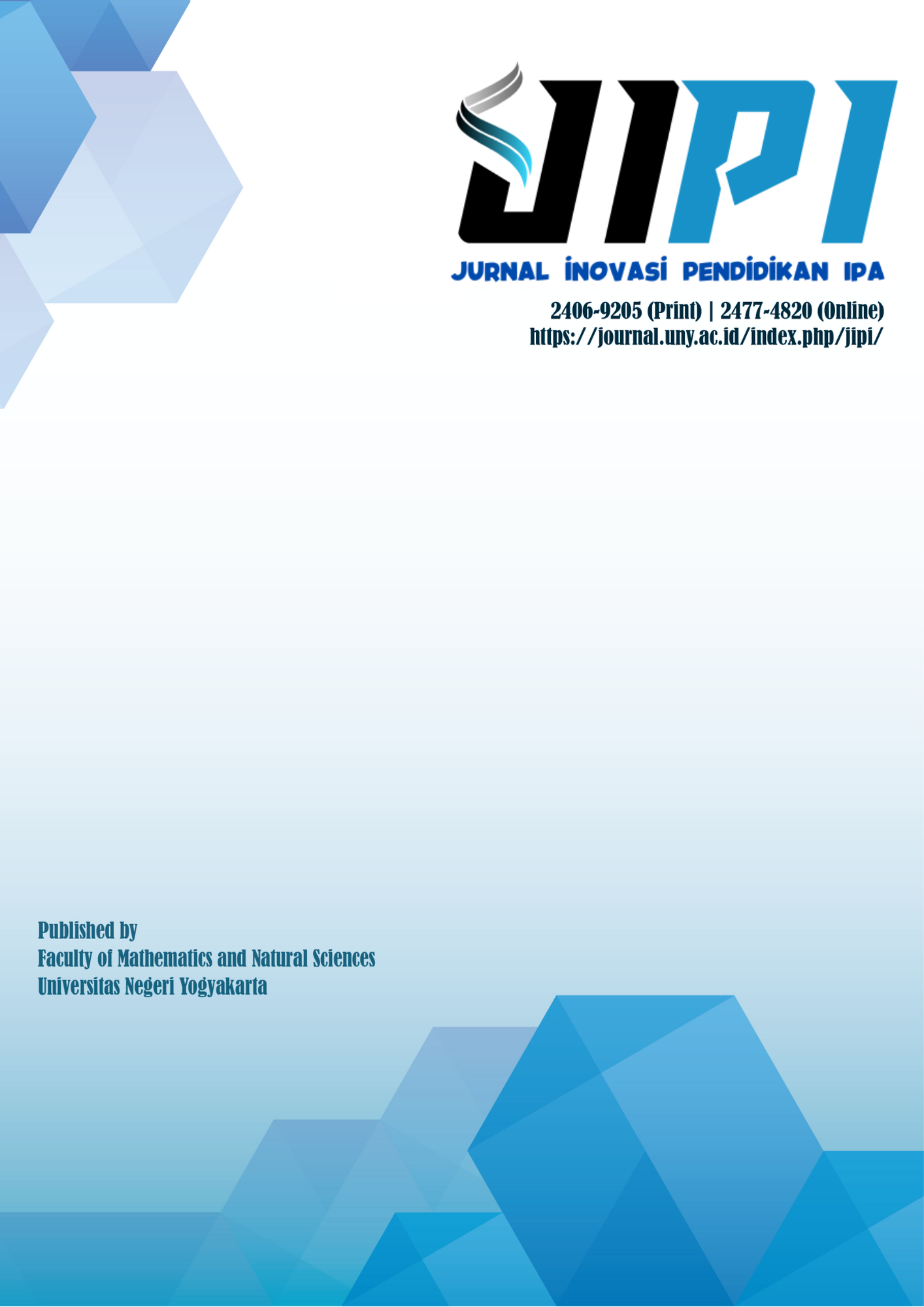Effectiveness of Discovery Learning Assisted by Chemical Monopoly on Critical Thinking and Learning Outcomes
DOI:
https://doi.org/10.21831/jipi.v11i2.84674Keywords:
acids and bases, chemistry monopoly, critical thinking, discovery learning, learning outcomesAbstract
The purpose of this research is to determine the effect of the discovery learning model using chemistry monopoly media on the critical thinking skills and learning outcomes of 11th-grade students. This research employs a quantitative descriptive approach with a quasi-experimental design and a pretest-posttest nonequivalent control group design, utilizing instruments in the form of tests and an observation guide. The sampling technique used is cluster random sampling. Both the experimental class and the control class have 35 students. This study collected data through tests (pretest and posttest). Data analysis was conducted using normality and homogeneity tests, followed by the Mann-Whitney U test (since the data are not normally distributed), and the N-Gain test for assessing learning effectiveness. The research results indicate that the experimental class achieved a 58.79% increase in learning outcomes, whereas the control class experienced a 36.51% increase. In terms of critical thinking ability, the experimental class showed an improvement of 56.00%, while the control class improved by 37.18%. The Mann-Whitney U hypothesis test revealed the significance of cognitive learning outcomes to be 0.041 and the significance of critical thinking ability to be 0.019. Thus, the implementation of discovery learning affects students' critical thinking skills and learning outcomes in the context of acid-base chemistry
References
Anwar, Y., Slamet, A., & Daniaty, U. (2023). Improving critical thinking skills through discovery learning models assisted animation video on digestive system material. JPBI (Jurnal Pendidikan Biologi Indonesia), 9(3), 433–444. https://doi.org/10.22219/jpbi.v9i3.29042
Childs, P. E., & Sheehan, M. A. (2007). What Chemistry Topics Do Students Find Difficult ? Proceedings Ofthe 2 European Variety in Chemistry Education, 38–43.
Chusni, M. M. (2022). Effectiveness of discovery learning-based multiple representation module on enhancing the critical thinking skills of the students with high and low science process skills. Jurnal Inovasi Pendidikan IPA, 8(2), 199–209. https://doi.org/10.21831/jipi.v8i2.49340
Chusni, M. M., Saputro, S., Suranto, & Rahardjo, S. B. (2020). The potential of discovery learning models to empower students’ critical thinking skills. Journal of Physics: Conference Series, 1464(1). https://doi.org/10.1088/1742-6596/1464/1/012036
Dahlan, R. R., Sugiarti, S., & Hasri, H. (2023). Pengaruh Model Discovery Learning terhadap Kemampuan Berpikir Kritis dan Hasil Belajar Redoks Peserta Didik SMAN 2 Buru. Chemistry Education Review (CER), 6(2), 141. https://doi.org/10.26858/cer.v6i2.45204
Ennis, R. (2011). The Nature of Critical Thinking: An Outline of Critical Thinking Dispositions and Abilities. Informal Logic, 6(2), 1–8. https://doi.org/10.22329/il.v6i2.2729
Facione, P. a. (2011). Critical Thinking : What It Is and Why It Counts. In Insight assessment (Issue ISBN 13: 978-1-891557-07-1.).
Fauzi, A. M., & Abidin, Z. (2019). Analisis Keterampilan Berpikir Kritis Tipe Kepribadian Thinking-Feeling Dalam Menyelesaikan Soal PISA. Suska Journal of Mathematics Education, 5(1), 1. https://doi.org/10.24014/sjme.v5i1.6769
Fisher, A. (2011). Critical Thinking: An Introduction. In Cambridge University.
Galbinur, E., Fadilah, M., Fitri, R., & Selaras, G. H. (2023). Analisis Kemampuan Berpikir Kritis Siswa SMA Melalui Penerapan Model Pembelajaran. Educativo: Jurnal Pendidikan, 2(1), 334–341. https://doi.org/10.56248/educativo.v2i1.143
Hidayati, R., & Kurniawati, D. (2021). Pengembangan Soal Berpikir Kritis pada Materi Asam Basa dan Titrasi Asam Basa. Entalpi Pendidikan Kimia, 2(1), 66–76. https://doi.org/10.24036/epk.v2i1.135
Kean, E., & Middlecamp, C. (1985). Panduan Belajar Kimia Dasar. Gramedia.
Laeni, S., Zulkarnaen, Z., & Efwinda, S. (2022). Model Discovery Learning terhadap Kemampuan Berpikir Kritis Siswa SMA Negeri 13 Samarinda Materi Impuls dan Momentum. Jurnal Literasi Pendidikan Fisika (JLPF), 3(2), 105–115. https://doi.org/10.30872/jlpf.v3i2.935
Mahesti, G., & Koeswanti, H. (2021). Pengembangan Media Pembelajaran Permainan Monopoli Asean untuk Meningkatkan Hasil Belajar Tema 1 Selamatkan Makhluk Hidup Pada Siswa Kelas 6 Sekolah Dasar. MIMBAR PGSD Undiksha, 9(1), 30. https://doi.org/10.23887/jjpgsd.v9i1.33586
Malikah, S., & Wafroturrohmah, W. (2022). Konsep Pendidikan Abad 21:untuk Pengembangan Sumber Daya Manusia SMA. JIIP - Jurnal Ilmiah Ilmu Pendidikan, 5(7), 2609–2614. https://doi.org/10.54371/jiip.v5i7.730
Miranda, E. D., Copriady, J., & Susliawati. (2012). Penggunaan permainan monopoli sebagai media chemo-edutainment untuk meningkatkan prestasi belajar siswa pada pokok bahasan koloid di kelas XI IPA MAN 2 model pekanbaru. Jurnal Online Mahasiswa Fakultas Keguruan Dan Ilmu Pendidikan Universitas Riau (JOM FKIP UNRI), 2(1), 1–10.
Nuraeni, S., Feronika, T., & Yunita, L. (2019). Implementasi Self-Efficacy dan Keterampilan Berpikir Kritis Siswa Pada Pembelajaran Kimia di Abad 21. Jambura Journal of Educational Chemistry, 1(2), 49–56. https://doi.org/10.34312/jjec.v1i2.2553
OCDE. (2023). PISA 2022 Results (Volume I): The State of Learning and Equity in Education. In Perfiles Educativos (Vol. 46, Issue 183). PISA, OECD Publishing. https://doi.org/10.22201/iisue.24486167e.2024.183.61714
Pratama, G. W., Ashadi, A., & Indriyanti, N. Y. (2017). Efektivitas Penggunaan Modul Pembelajaran Kimia Berbasis Problem-Based Learning ( PBL) Untuk Meningkatkan Kemampuan Berpikir Siswa Pada Materi Koloid Sma Kelas XI Kritis. Prosiding Seminar Nasional Pendidikan Sains (SNPS), 21, 150–156.
Putri, R. M. R., Sudarno, & Octoria, D. (2024). Pengaruh Model Problem Based Learning dan Discovery Learning dengan Media Wordwall terhadap Keterampilan Berpikir Kritis (Studi Eksperimen pada Siswa Kelas XI SMA Negeri 7 Surakarta Jurusan Ilmu Pengetahuan Sosial Tahun Ajaran 2023/2024). Journal on Education, 06(02), 12302–12313.
Rahmi, D. (2020). Penggunaan Model Discovery Learning Dengan Metode Permainan Pada Pembelajaran Matematika Untuk Meningkatkan Hasil Belajar. Inovasi Pendidikan, 7(2), 14–22. https://doi.org/10.31869/ip.v7i2.2299
Ravinah, W. R., Kusumawardani, R., & Usman. (2019). Pengaruh media monopoli terhadap hasil belajar siswa SMA pada pokok bahasan larutan elektrolit dan nonelektrolit. Bivalen: Chemical Studies Journal, 2(2), 20–23. https://doi.org/10.30872/bcsj.v2i2.310
Salamun, Widyastuti, A., Syawaluddin, Iwan, R. N. A., Simarmata, J., Simarmata, E. J., Suleman, Y. N., Lotulung, C., & Arief, M. H. (2023). Buku-Referensi-Model-Model-Pembelajaran-Inovatif.
Sapitri, U. E., Kurniawan, Y., & Sulistri, E. (2016). Penerapan Model Discovery Learning Untuk Meningkatkan Keterampilan Berpikir Kritis Siswa Kelas X Pada Materi Kalor. JIPF (Jurnal Ilmu Pendidikan Fisika), 1(2), 64. https://doi.org/10.26737/jipf.v1i2.66
Sary, K., & Dina, D.-. (2023). Peningkatan Keaktifan dan Prestasi Belajar Kognitif Siswa melalui Penerapan Media Permainan Monopoli pada Materi Ikatan Kimia di SMA Negeri Surulangun. Jurnal Pendidikan Matematika Dan Sains, 11(2), 10–19. https://doi.org/10.21831/jpms.v11i2.67348
Setianingsih, R., & Roshayanti, F. (2022). Kemampuan Berpikir Kritis Peserta Didik pada Pembelajaran Kimia dalam Pokok Bahasan Laju Reaksi di SMA Negeri 1 Bantarbolang. Media Penelitian Pendidikan : Jurnal Penelitian Dalam Bidang Pendidikan Dan Pengajaran, 16(1), 5–9.
Snyder, L. G., & Snyder, M. J. (2008). Optional Teaching Critical Thinking and Problem Solving Skills. The Journal of Research in Business Education, 50(2), 90.
Sudjana, N. (2010). Penilaian Hasil Proses Belajar Mengajar (Cetakan ke-15). Remaja Rosdakarya.
Sukarelawan, Moh. I., Indratno, T. K., & Ayu, S. M. (2024). N-Gain vs Stacking.
Sukmadinata, N. S. (2007). Landasan Psikologi Proses Pendidikan. In Remaja Rosdakarya, Bandung.
Wahyuning, S. (2022). Pembelajaran Ipa Interaktif Dengan Game Based Learning. Jurnal Sains Edukatika Indonesia (JSEI), 4(2), 1–5.
Wibisono, M. I. Y. (2023). Tingkatkan Berpikir Kritis Siswa. CV Sketsamedia.
Downloads
Published
How to Cite
Issue
Section
Citation Check
License
Copyright (c) 2025 Jurnal Inovasi Pendidikan IPA

This work is licensed under a Creative Commons Attribution-ShareAlike 4.0 International License.
The authors submitting a manuscript to this journal agree that, if accepted for publication, copyright publishing of the submission shall be assigned to Jurnal Inovasi Pendidikan IPA (JIPI). However, even though the journal asks for a copyright transfer, the authors retain (or are granted back) significant scholarly rights.
Jurnal Inovasi Pendidikan IPA by http://journal.uny.ac.id/index.php/jipi/index is licensed under a Creative Commons Attribution-ShareAlike 4.0 International License.










